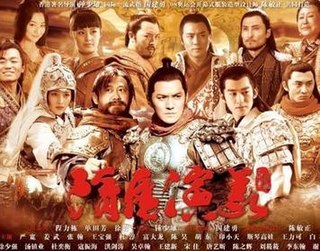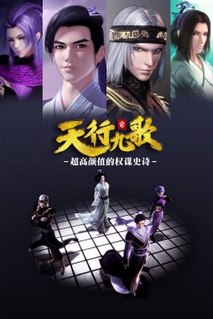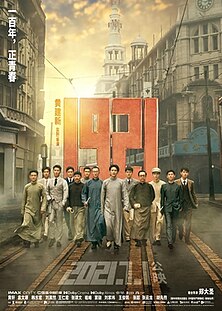
The Central Academy of Drama, abbreviated Zhong Xi, is a drama school in Beijing, China. It is a Chinese state Double First Class University Plan university identified by the Ministry of Education of China. The school is the first theatre higher educational institution of the People's Republic of China. It is ranked as the best top-level drama, film, and television arts institution in China and has been selected into the country's Double First Class University Plan. The Central Academy of Drama is a central subordinate university and is also an art college directly under the Ministry of Education. It is the highest institution of education in dramatic art among the world's leading art institutions in Chinese drama, visual arts teaching and research center. The Central Academy of Drama is also the headquarters of the World Theatre Education Alliance (WTEA), China Alliance of Theatre Higher Educational Institutes and Asia Theatre Education Centre (ATEC). The Central Academy of Drama has engaged in the practice of drama and the visual arts for more than 50 years and is a bastion of experimental theater drama in China. The school also holds the UNESCO Chair on Theatre Education.

Suona, also called dida, laba or haidi, is a traditional Chinese music instrument with double-reed horn. The suona's basic design originated in ancient Iran, then called "Surna". Suona appeared in China around the 3rd century. It had a distinctively loud and high-pitched sound, and was used frequently in Chinese traditional music ensembles, particularly in those that perform outdoors. It was an important instrument in the folk music of northern China, particularly in provinces of Shandong and Henan, where it has long been used for festival and military purposes. It is still being used, in combination with sheng mouth organs, gongs, drums, and sometimes other instruments in weddings and funeral processions. Such wind and percussion ensembles are called chuida or guchui. Stephen Jones has written extensively on its use in ritual music of Shanxi province. It was also common in the ritual music of Southeast China. In Taiwan, it was an essential element of ritual music that accompanied Daoist performances of both auspicious and inauspicious rites, i.e., those for both the living and the dead. One of the most famous piece that uses suona as the leading instrument is called "Bai Niao Chao Feng". The movie Song of the Phoenix casts the rise and fall of the popularity of suona in modern Chinese musical history.

The Emperor in Han Dynasty, also released under the title The Emperor Han Wu in some countries, is a 2005 Chinese historical drama television series based on the life of Emperor Wu of the Han dynasty. It uses the historical texts Records of the Grand Historian and Book of Han as its source material.

Lingnan is a geographic area referring to the lands in the south of the Nanling Mountains. The region covers the modern Chinese subdivisions of Guangdong, Guangxi, Hainan, Hong Kong, and Macau, as well as modern northern to central Vietnam.

Three Kingdoms is a 2010 Chinese television series based on the events in the late Eastern Han dynasty and the Three Kingdoms period. The plot is adapted from the 14th century historical novel Romance of the Three Kingdoms and other stories about the Three Kingdoms period. Directed by Gao Xixi, the series had a budget of over 160 million RMB and took five years of pre-production work. Shooting of the series commenced in October 2008, and it was released in China in May 2010.

The Water Margin is a 1998 Chinese television series adapted from Shi Nai'an's classical 14th-century novel of the same title. It was produced by CCTV with Zhang Jizhong as producer. It was first broadcast in China in January 1998. The series also featured action choreography by Yuen Woo-ping.

All Men Are Brothers is a 2011 Chinese television series adapted from Shi Nai'an's 14th century novel Water Margin, one of the Four Great Classical Novels of Chinese literature. The series is directed by Kuk Kwok-leung and features cast members from mainland China, Taiwan and Hong Kong. The series was first broadcast on 8TV in March 2011 in Malaysia.

1911, is a 2011 Chinese historical drama film about the 1911 Revolution in China, produced to commemorate the revolution's 100th anniversary. Directed by Jackie Chan and Zhang Li, the film stars Chan in his 100th film as an actor, alongside an ensemble cast that includes Winston Chao, Li Bingbing, Joan Chen, Hu Ge, and Chan's son Jaycee Chan. It was released on 23 September 2011 in mainland China and on 29 September in Hong Kong; it also opened on the 24th Tokyo International Film Festival later in October.

Outlaws of the Marsh is a Chinese television series adapted from Shi Nai'an's classical 14th century novel Water Margin. It was first broadcast on Shandong TV in China in 1983, and was not completed until 1986. The series was one of the earliest television dramas with an ancient China setting to be produced in mainland China. It was divided into different parts, each focusing on the story line of a certain character. Widely regarded as a classic in mainland China, the series won a Golden Eagle Award.

The Han Triumph, also known as Wind Ode, is a Chinese television series based on historical events in the early Han dynasty, beginning with the founding of the dynasty by Liu Bang after his triumph over Xiang Yu, and the events leading to the reign of Liu Heng. Directed by Huang Jianzhong, the series starred Ray Lui, Wang Ji, Liu Mu, Zhang Guangbei, Chen Wei and Li Qingxiang in the leading roles. It was first broadcast on CCTV-8 in China on 17 December 2011.

Justice Bao is a Chinese TV series starring producer Jin Chao-chun as the Song dynasty official Bao Zheng. The series ran for 3 seasons from 2010 to 2012. In addition to Jin, Kenny Ho, Fan Hung-hsuan and Lung Lung again reprise their iconic roles from the 1993 Taiwanese hit Justice Pao and the 2008 Chinese series Justice Bao.

Legend of the Phoenix is a 2019 Chinese historical romantic comedy television series starring He Hongshan, Jeremy Tsui, Cao Xiwen and Wayne Lai. Produced by Shanghai Tencent Penguin Film Culture Communication Co., Ltd and Shanghai Drama Apple Limited, it debuted on Tencent Video and myVideo on May 28, 2019. The series followed the love story between Ye Ningzhi, a travelling artist, and General Wei Guang during the Great Liang in ancient China.

Heroes in Sui and Tang Dynasties is a Chinese television series based on Chu Renhuo's historical novel Sui Tang Yanyi, which romanticises the historical events leading to the fall of the Sui dynasty and the rise of the Tang dynasty. The series was first broadcast in mainland China on various television networks on 14 January 2013. It is not to be confused with Heroes of Sui and Tang Dynasties 1 & 2, a similar television series also based on the novel, but was released earlier in December 2012. Filming for the series started on 5 November 2011 at the Hengdian World Studios and wrapped up in May 2012.

The Romance of the Condor Heroes is a 2014–15 Chinese television series produced by Yu Zheng and adapted from Jin Yong's novel The Return of the Condor Heroes, with additional material from the preceding novel, The Legend of the Condor Heroes. It stars Chen Xiao and Michelle Chen in the lead roles. The series was first broadcast on Hunan TV from 3 December 2014 to 11 March 2015.
Wang Jianzhong (1933–2016) was a Chinese composer, pianist, and educator. His works, many of them composed during the Cultural Revolution, bridge Chinese folk music and Western classical piano tradition and have made him a household name in his own country. His A Hundred Birds Paying Homage to the Phoenix is considered one of the six representative twentieth-century Chinese piano masterpieces.

Nine Songs of the Moving Heavens, is a Chinese animated CG TV series which was released on March 10, 2016 and produced by Robin Shen and directed by Chen Qianyuan. It can also be translated as Nine Songs of the Sky. This series is the prequel to The Legend of Qin, which takes place before the time of the Qin Dynasty. In an interview with Robin Shen, it was stated although the two animated series have intersections of characters and timelines, Nine Songs of the Moving Heavens is an independent story with the focus on the creation of the Quicksand group by the Ninth Prince of Han, Han Fei.
Dongfang Shuo is a 2008 Chinese historical and biographical television series centered on Dongfang Shuo, a Han dynasty scholar-official, fangshi, author, and court jester to Emperor Wu. It is base on the novel Wisdom Holy Dongfang Shuo by Dongfang Longyin. The series was jointly by China Central Television, Beijing Film Academy and Guangdong Donghexing Recording and Video Company. The series stars Cheng Qian as Dongfang Shuo, the rest of the main cast includes Jin Dong, Hu Ke, Qin Hailu, Yu Xiaowei, Liu Xiyuan, Hu Yajie, Tao Huimin, and Zhang Lingxin. It originally aired on CCTV-8 in August 2008.

1921 is a 2021 Chinese historical film directed by Huang Jianxin and Zheng Dasheng and starring Huang Xuan, Ni Ni, Wang Renjun and Liu Haoran. The film tells the story of the founding of the Chinese Communist Party at the 1st National Congress of the Chinese Communist Party held in Shanghai. The film premiered in China on 1 July 2021, to commemorate the centennial year anniversary of the Chinese Communist Party.
















